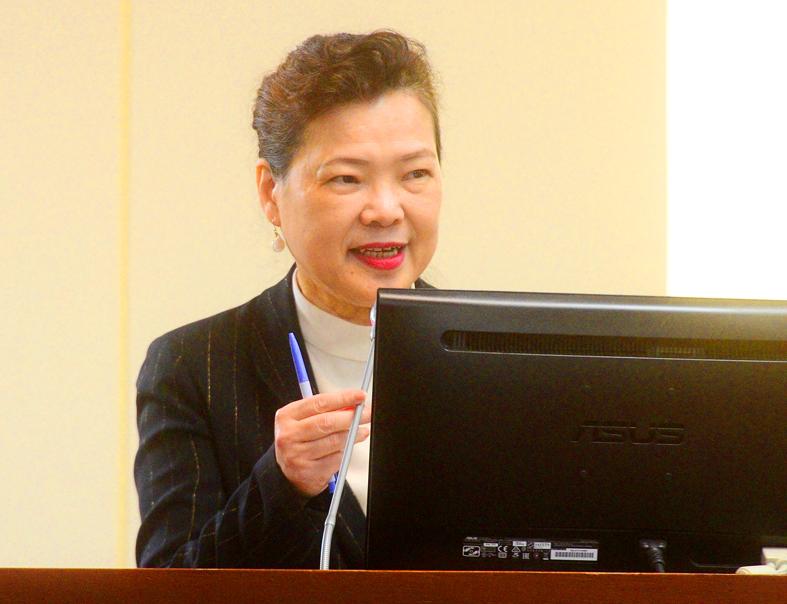The government’s energy transition plan depends on the construction of the proposed third liquified natural gas (LNG) terminal off the coast of Datan Borough (大潭) in Taoyuan’s Guanyin District (觀音) to increase LNG power generation, Minister of Economic Affairs (MOEA) Wang Mei-hua (王美花) said yesterday.
“If we do not have the third LNG terminal as planned, we will not be able to reach 50 percent electricity generation from natural gas and 30 percent electricity generation from coal” by 2025, Wang said at a meeting of the legislature’s Economics Committee in Taipei.
In December last year, 41.5 percent of Taiwan’s electricity came from coal-fired plants, 40.1 percent from natural gas, 14.4 percent from nuclear power and 5.8 percent from renewables, Bureau of Energy data showed.

Photo: Wang Yi-sung, Taipei Times
The government plans to phase out nuclear power by 2025, reduce the use of coal to 30 percent and boost renewables to 20 percent.
The two existing LNG receiving terminals are already running at full capacity, necessitating the third LNG terminal, Wang said.
Democratic Progressive Party Legislator Chiu Chih-wei (邱志偉) asked Wang whether the ministry has a backup plan if a referendum to block the terminal plan prevails.
“As of now, there is no plan B,” Wang said. “The MOEA calls for the swift construction of the third LNG terminal to reduce the amount of coal burned.”
“Gas from the third LNG terminal would fulfill the power needs of 10 million Taiwanese and close the power gap in the north of Taiwan,” Wang said. “This would allow us to generate power where it is used, lowering systemic risk.”
LNG power generation releases approximately 50 percent less greenhouse gas than coal-fired power generation, and much fewer pollutants.
The 5,824 megawatt Taichung Power Plant is the third-largest coal-fired plant in the world and is often fined by the Taichung City Government for using too much coal.

MULTIFACETED: A task force has analyzed possible scenarios and created responses to assist domestic industries in dealing with US tariffs, the economics minister said The Executive Yuan is tomorrow to announce countermeasures to US President Donald Trump’s planned reciprocal tariffs, although the details of the plan would not be made public until Monday next week, Minister of Economic Affairs J.W. Kuo (郭智輝) said yesterday. The Cabinet established an economic and trade task force in November last year to deal with US trade and tariff related issues, Kuo told reporters outside the legislature in Taipei. The task force has been analyzing and evaluating all kinds of scenarios to identify suitable responses and determine how best to assist domestic industries in managing the effects of Trump’s tariffs, he

TIGHT-LIPPED: UMC said it had no merger plans at the moment, after Nikkei Asia reported that the firm and GlobalFoundries were considering restarting merger talks United Microelectronics Corp (UMC, 聯電), the world’s No. 4 contract chipmaker, yesterday launched a new US$5 billion 12-inch chip factory in Singapore as part of its latest effort to diversify its manufacturing footprint amid growing geopolitical risks. The new factory, adjacent to UMC’s existing Singapore fab in the Pasir Res Wafer Fab Park, is scheduled to enter volume production next year, utilizing mature 22-nanometer and 28-nanometer process technologies, UMC said in a statement. The company plans to invest US$5 billion during the first phase of the new fab, which would have an installed capacity of 30,000 12-inch wafers per month, it said. The

Taiwan’s official purchasing managers’ index (PMI) last month rose 0.2 percentage points to 54.2, in a second consecutive month of expansion, thanks to front-loading demand intended to avoid potential US tariff hikes, the Chung-Hua Institution for Economic Research (CIER, 中華經濟研究院) said yesterday. While short-term demand appeared robust, uncertainties rose due to US President Donald Trump’s unpredictable trade policy, CIER president Lien Hsien-ming (連賢明) told a news conference in Taipei. Taiwan’s economy this year would be characterized by high-level fluctuations and the volatility would be wilder than most expect, Lien said Demand for electronics, particularly semiconductors, continues to benefit from US technology giants’ effort

‘SWASTICAR’: Tesla CEO Elon Musk’s close association with Donald Trump has prompted opponents to brand him a ‘Nazi’ and resulted in a dramatic drop in sales Demonstrators descended on Tesla Inc dealerships across the US, and in Europe and Canada on Saturday to protest company chief Elon Musk, who has amassed extraordinary power as a top adviser to US President Donald Trump. Waving signs with messages such as “Musk is stealing our money” and “Reclaim our country,” the protests largely took place peacefully following fiery episodes of vandalism on Tesla vehicles, dealerships and other facilities in recent weeks that US officials have denounced as terrorism. Hundreds rallied on Saturday outside the Tesla dealership in Manhattan. Some blasted Musk, the world’s richest man, while others demanded the shuttering of his